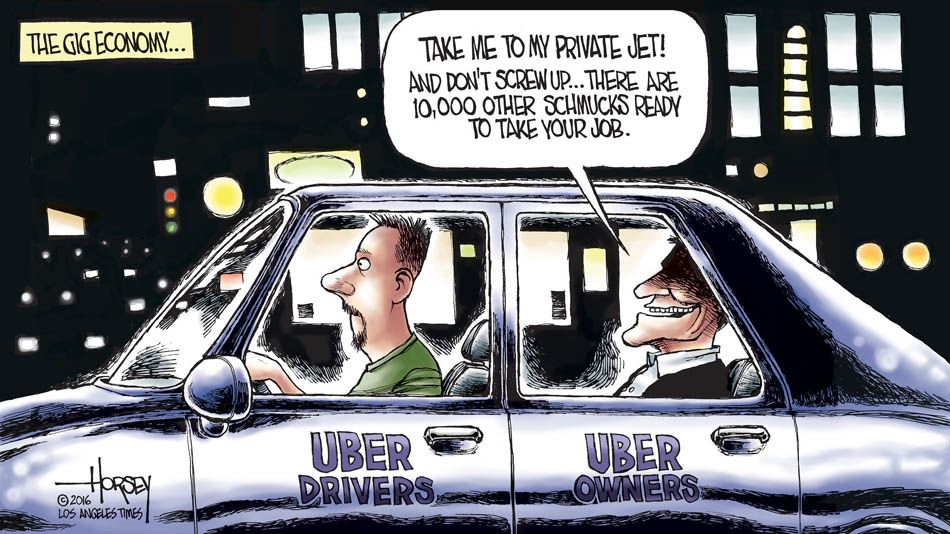Kiwithrottlejockey
Admin Staff
XNC2 GOD

Posts: 32251
Having fun in the hills!
|
 |
« on: May 17, 2016, 01:11:22 pm » |
|
from the Los Angeles Times....Uber drivers are sideswiped by the ruthless gig economyBy DAVID HORSEY | 5:00AM PDT - Monday, May 17, 2016 WHEN I go to the airport, I drive and pay to park my car for a few days, or I ride public transit if I have the time, or I call a taxi. So far, I have never used Uber or Lyft in order to save a few bucks. It would make me feel morally compromised. WHEN I go to the airport, I drive and pay to park my car for a few days, or I ride public transit if I have the time, or I call a taxi. So far, I have never used Uber or Lyft in order to save a few bucks. It would make me feel morally compromised.
Sure, I've had the same complaints that many others have about the traditional cab companies — scarce or tardy taxis, shabby cars, high fares — but, at least for me, the bad experience is a rare exception. I know I could save money riding with Uber, but I dislike the business model: a model that exemplifies an emerging new economy in which a few people get very rich and everyone else is a freelancer struggling to patch together a living wage.
Uber's owners were smart enough to create an app that would link people seeking rides with Uber drivers. For their cleverness, they are now billionaires with a business that has spread across the world amid protests and controversy. The drivers on whom this entire commercial empire is built generally make less than traditional cabbies and receive zero benefits from the company. That is because Uber classifies them as independent contractors.
In an opinion article in Sunday's Los Angeles Times, freelance writer Sandra VahtelSS detailed her experience working as an Uber driver. She quickly learned that boasts about drivers earning as much as $6,000 a month either were overblown or were not indicative of the norm. “On my third day behind the wheel, I sat in the car for 11 hours, drove for seven of them, and grossed $118 before deducting the cost of gas, wear and tear, rideshare insurance and income tax,” Vahtel said.
Backing away from early claims that drivers in some cities were making up to $90,000 a year, Uber and Lyft now emphasize that driving for them was never meant to be a career. “Indeed, most drive now for supplemental income,” Vahtel said. “So Uber and Lyft decimated the market share of traditional taxis on the backs of part-time contractors — and spend millions on lawyers and political lobbyists to keep operating that way.”
The Uber and Lyft model grows out of the prevalent practice in high-tech startups. A small group of founding entrepreneurs come up with a novel way to get rich, then build their companies on the backs of under-compensated, overworked employees who are easily replaceable. They give their workers ping-pong tables and free snacks, but take away their rights to organize for better pay, benefits or job security.
The use of so-called independent contractors (or “associates” or other euphemistic terms for freelancers) has spread across all sectors of the economy. I should note that I am, myself, a contractor. Luckily, I have a fairly rare skill that is valued by my employer. (If all the political cartoonists in America were brought together, they wouldn't even fill the Los Angeles Times lunchroom.) But millions of people know how to drive. They have their own cars and their own bills to pay. So, out of that huge pool, Uber and Lyft have little problem finding plenty of people willing to work for them for a few months before moving on to the next poorly paying gig.
Meanwhile, in Silicon Valley and Seattle and Austin and other centers of the tech world, there is a steady influx of college-educated millennials looking for a slot in a rising enterprise — young people who quickly learn it is unwise to make waves or to expect loyalty from their employer. And in many older companies, long-time employees suddenly find their status changed from permanent to provisional and their hours and income reduced — that is, if they are not replaced altogether by lower-paid “temps”.
Back in the day, employers would have had a tougher time getting away with this stuff. Labor unions leveled the playing field, protected workers' rights and won good wages and benefits in many industries. Still, I'm not an uncritical fan of the old system. The great flaw in the adversarial model of employees versus management was that it relied on intimidation, brinksmanship and actions that could be destructive to everyone's interests.
In the best of worlds, we would all be in this together — owners and workers with a common stake in success and a shared voice in how the work and rewards would be divided. Unions used to wrest a fair share of benefits from the bosses through struggle. Now, with unions severely diminished and pretty much absent in new industries, the only struggle left is the struggle of millions of people trying to hang on to a middle-class life while a few wise guys at the top amass extreme wealth from their workers' labor.
Is it any wonder the presidential campaign of 2016 has been dominated by alienated, angry Americans “feeling the Bern” or rolling the dice with Trump?http://www.latimes.com/opinion/topoftheticket/la-na-tt-uber-economy-20160516-story.html
|